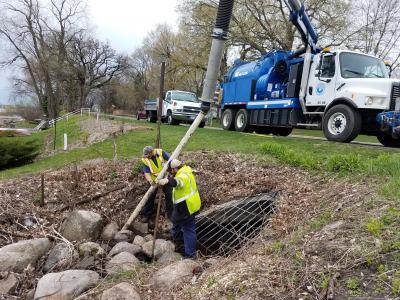- Community
- Services
-
Your Government
-
Column 1
- Agendas and Minutes
- Mayor & City Council
- Boards & Commissions
- City Charter
- City Projects
- City Calendar
Column 2
Column 3
-
Stormwater Program
Stormwater runoff is a leading source of water pollution. Rain and snow melt run over the hard surfaces - such as roads, sidewalks, driveways, parking lots, etc. - and pick up pesticides, fertilizers, oils, metals, road salt, sediment, trash and other pollutants and carry them into storm sewer systems. These storm sewer systems discharge directly into lakes, streams, rivers and wetlands. Local public entities, including the City of White Bear Lake, that own or operate a municipal separate storm sewer system (MS4) play a key role in preventing stormwater runoff from harming these water resources.
MS4s in Minnesota must satisfy requirements of the Minnesota Pollution Control Agency (MPCA) MS4 general permit to reduce the amount of sediment and other pollutants entering state waters from stormwater systems. Entities regulated by the MS4 general permit must develop a stormwater pollution prevention program (SWPPP) and adopt best practices to reduce the discharge of pollutants from its storm sewer system.
The City's SWPPP guides the City's stormwater pollution reduction efforts in the following categories, called Minimum Control Measures (MCM's):
- Public education and outreach
- Public participation/involvement
- Illicit discharge detection and elimination
- Construction site storm water runoff control
- Post-construction storm water management
- Pollution prevention / good housekeeping
- Impaired Waters
The City identified Best Management Practices (BMPs) and measurable goals associated with each MCM. The City's annual report to the MPCA provides a summary of the City's status of complying with the permit and identifies the BMPs being used toward achieving the City's identified goals.


